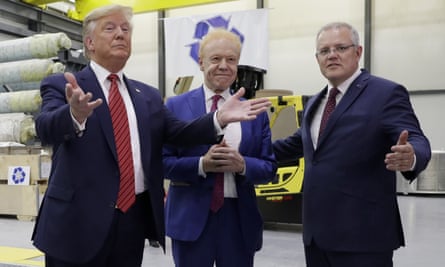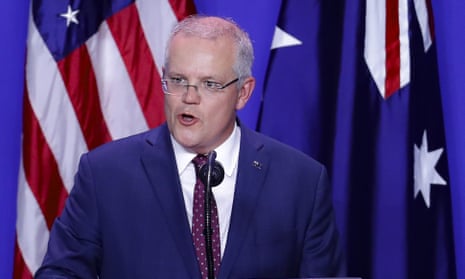Scott Morrison has challenged China to do more heavy lifting on climate change, saying Australia welcomes its economic growth, but that prosperity and power also come with responsibility.
The Australian prime minister used the keynote speech of his US visit, at the Chicago Institute for Global Affairs on Monday, to praise China’s “economic maturity”. Morrison characterised China as a “newly developed” rather than a developing economy, and argued that status conferred developed-world obligations on the Chinese leadership.
“Having achieved this status, it is important that China’s trade arrangements [and] participation in addressing important global environmental challenges, with transparency in their partnerships and support for developing nations, reflect this new status and the responsibilities that go with it as a world power,” Morrison said.
He said global institutions “must adjust their settings for China, in recognition of this new status. That means more will be expected, as has always been the case for nations like the United States.”
Morrison’s comments signal that Australia has shifted its policy on global responsibility for combating the climate emergency.
With the UN climate action summit under way in New York, Morrison is arguing that China needs to contribute more to the global effort to reduce greenhouse gas emissions – to make a developed economy contribution rather than be given more leniency as a developing economy – a stance Beijing rejects.
Guardian Australia revealed earlier this month Morrison was not attending the New York summit, despite the fact he will arrive at the UN later on Monday. Australia is deploying the foreign affairs minister, Marise Payne, and the Australian ambassador for the environment, Patrick Suckling, instead. Only countries with new concrete commitments to announce were allocated speaking spots at the event.
China wants support from developed nations
Ahead of the New York summit, China flatly rejected Morrison’s argument that it needed to do more to reduce emissions, pointing to the longstanding principle in global climate negotiations of “common but differentiated responsibilities”.
In a statement from the ministry of ecology and environment, China said climate action needed to be proportionate with “respective capabilities, in the light of different national circumstances”.
China also signalled it wanted support from developed countries to help it manage the transition.
“In particular, the developed countries should implement and strengthen their commitments to providing financial and technological assistance to developing countries, opening markets and carrying out practical technological cooperation – thus creating the basis for mutual trust and important conditions for comprehensive and effective implementation of the Paris agreement,” the statement said.
“As the largest developing country, China is also entitled to funds support. China urges the developed countries to honour the commitment of US$100bn allocation each year from 2020 on to support the developing world in addressing climate change.”
Australia wants an end to the damaging trade dispute between Washington and Beijing that is imperilling global growth. But Morrison also sees benefit for Australia if Donald Trump’s profound disruption of the relationship ultimately forces China to reset its rules of engagement for trade agreements, market access and inbound foreign investment.
‘Global trade rules no longer fit for purpose’
Morrison told his American audience the world was grappling with the end of one era and the dawn of another, confronting “a changing economic order and transformative technological change”.
He said Australia was on the frontline of the change in the Indo-Pacific, “the region that will continue to shape our prosperity, security and destiny and, increasingly, the global balance of power”.
Morrison said Australia’s principles for regional engagement were a commitment to open markets “and the free flow of trade based on rules, not coercion”; respect for sovereignty of nations, irrespective of size; and respect for international law and the peaceful resolution of disputes.

In a hat tip to his American hosts, Morrison said the economic expansion of China had been facilitated “by the stability underwritten by US strategic engagement and the international community who built the global trading system and welcomed China’s accession to the World Trade Organisation”.
Morrison said the US “led the way in the creation of financial institutions and economic forums that established equitable rules to stabilise the international economy and remove the points of friction that had contributed to two world wars”.
But he said the world trading system now needed reform.
“We cannot pretend that rules that were written a generation ago remain appropriate for today,” Morrison said.
“It is clear that global trade rules are no longer fit for purpose. In some cases, the rules were designed for another era, one that no longer exists. In other cases, our rules are not comprehensive.”
Morrison said it was obvious trade rules were not keeping pace with digital commerce and technological change.
Morrison was due to attend an event with Australian tech entrepreneurs on Monday before travelling to New York to attend the leaders’ dialogue on strategic responses to terrorist and violent extremist narratives at the UN, and to address the American Australian Association.
On Tuesday Morrison will have a range of bilateral meetings with world leaders before attending an oceans event at the UN hosted by the president of Palau and the prime minister of Norway. He will also attend a reception with Pacific island states, who have urged Australia to increase its ambition on climate change.
The prime minister will give a speech at the UN on Wednesday before returning to Australia.
Wong urges caution on trade war
Tuesday’s speech in Chicago comes as Labor’s foreign affairs spokeswoman, Penny Wong, argues that Australia needs to be careful to do more than “navigate the slipstream” as strategic competition between the US and China intensifies in the region.
In a speech to the Centre for Strategic and International Studies in Jakarta on Tuesday, Wong says that she looks forward to seeing what benefits Morrison has secured from the Washington visit, “particularly how he has been able to shape the administration’s thinking and language on the trade war”.
“The trade war, as currently conducted … undermines multilateralism and the rules-based trading system, including by reinforcing the idea that size and economic power determine the terms of engagement,” a draft version of Wong’s speech says.

She says that while the US and China will continue to jockey for influence in the region, Australia needed to be more than just a “spectator”.
“Great powers will do what great powers do – assert their interests. But the rest of us are not without our own agency,” Wong says.
“We are in fact faced with a choice – but it is not the US-China binary.
“The choice is this: are we simply to be spectators to the consequences of this strategic competition in our region, or do we work proactively and collectively to shape rules, norms and standards in line with our interests and values?”
Wong criticises both Beijing and Washington for seeking to disrupt the status quo, saying the Trump administration’s decision to withdraw from the Trans Pacific Partnership trade deal, the Paris agreement on climate change, the UN Human Rights Council, and the Iran nuclear deal indicated a rejection of the “norms to which we have become accustomed”.
She also said some of the “assertiveness” from Beijing in seeking to shape the region in line with its preferences and ambitions was not “conducive to the kind of region in which we want to live”.

Comments (…)
Sign in or create your Guardian account to join the discussion